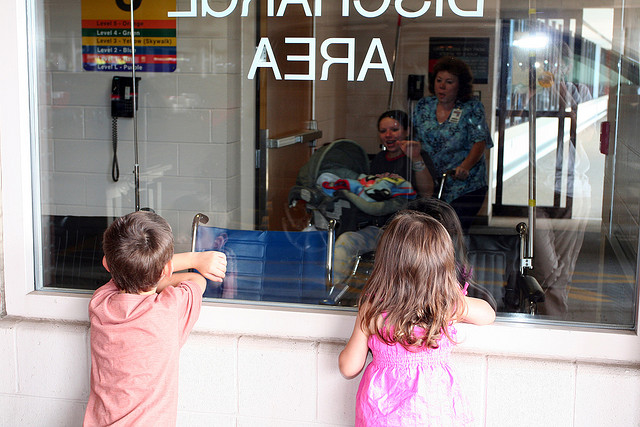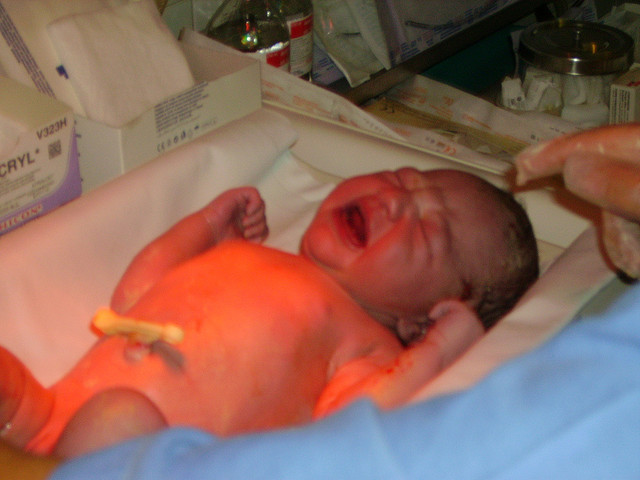Preparing for childbirth doesn’t just mean hiring a doula and packing your hospital bag; it also means getting ready for what might be the most challenging physical task you’ve ever faced. Improve your odds of having an easier, shorter labor by incorporating these healthy habits during your third trimester:
via 3 Surprising Tips For An Easier Labor – Fit Pregnancy.
- Eat dates
- Sleep more
- Strengthen your legs
Doesn’t this sound easy …it is! Check out Fit Pregnancy’s article for some simple things you can do to make your labor easier.Who would not want an “Easier Labor”.Have any of you ever used any of these tips?What was you labor like….easier….what you expected or difficult?
Tag Archives: Childbirth
How much control do you want during childbirth?
After recently reading a post about “who makes the decisions when you are in labor” my own labor and deliveries came to mind. Alongside were the memories of the numerous labor and deliveries that I attended as a nurse.
When I began my career, my first position was as an L & D nurse at a university teaching hospital in the Bronx. Starting out was frightening and never having had a child I had absolutely no experience of my own.
It was the early 70s and at this particular hospital, many of the patients did not want to be awake for the delivery of their baby.
Today, it is difficult to imagine such a time when moms did not want to control everything about pregnancy and delivery even before they actually conceive.
The young mom of the 70’s would actually ask to be ” knocked out ” for her labor and delivery. Usually she would add “just like my mother was when she had me”.
So back in the day, moms, who so wished, were given “twilight sleep” which was a mixture of several medications, one of which caused amnesia. So although a laboring woman could follow commands, move and talk, she had no recollection of what she was saying or doing or what was happening to her while in labor.
Husbands, significant others and family members were not allowed to be with a laboring woman who was medicated with this “cocktail”.
It was a privacy issue….since mom was unable to filter what she was saying. The medication was a type of truth serum of sorts. Sometimes during the stress of labor, a mom would call for someone other than her significant other which could indeed be problematic.
When it came time for delivery…mom would be taken to the delivery room. More often than not, general anesthesia was administered and a forcep delivery was done. Once the anesthesia was given the baby had to be delivered promptly which necessitated the use of forceps.
Natural childbirth, lamaze, and epidurals were the exception rather than the rule at this labor and delivery unit and in many units around the country. This was a standard of practice of the time.
After about a year at this particular hospital in the Bronx, I decided to move on to another university hospital in Manhattan.
It was a not only a change of hospital but I found myself in an entirely different world when it came to the practice of obstetrics.
Most women wanted to be awake for the birth of their baby, many had taken childbirth classes and epidurals were used frequently. There ware still forcep deliveries but there was no general anesthesia used for vaginal deliveries unless there was a complication.
In the 70s, doctors made most of the decisions and were not questioned too much, save for the few women who attended childbirth class with Elizabeth Bing, the founder of Lamaze here in the States.
Elizabeth Bing was adamant about teaching her mothers, who was the “boss” in labor and delivery. She encouraged moms to advocate for the type of delivery that they wanted, she gave them the tools to help question their doctors regarding any decisions that were being made during labor. It was really the “birth plan” in its infancy. Elizabeth Bing was a physical therapist not a nurse and she was opinionated with very strong beliefs in “natural childbirth”. I had much respect for her and took her LaMaze teacher certificate course so I could understand and support my patients in their effort to have less intervention during their labor and delivery.
The role of the obstetrician is, in my opinion, a very important one especially if intervention is needed. I know the statistics in the United States are not overwhelmingly better than other countries but I also know what I have personally experienced in my own deliveries and while taking care of other laboring moms. These experiences definitely skew my view in this area.
My one child had only an initial Apgar of 1 for a faint heartbeat at birth due to complications of a C-section for a transverse lie (sideways position of the fetus). Upon my arrival in L & D, I was already 8 centimeters dilated, which meant, get the baby delivered before the water broke and the cord prolapsed causing severe lack of oxygen to the baby. It was a scary moment for me and my husband…both of us medical professionals. My doctor moved swiftly while I cried not wanting a C-section but knowing that I needed one. I felt confident in their haste and let them do their work…I was not awake…although every attempt was made to allow me to remain so. The discomfort was just too much…so asleep I went. I did not see my little girl for over 24 hours due to her own medical needs.
As for who should make the calls during childbirth…that is a very complex question with many variables. As best as I can figure, it takes a “Village” to raise a child but it also takes a “Village” sometimes to deliver a healthy baby to a healthy mom. I wish that all deliveries and pregnancies went smoothly and that all doctors could be “kind” at all times with great bedside manners. Unfortunately, we are all human and at a time of “flight or fight” you want someone who is able to “fight” for you and your baby based on good sound medical decisions which sometimes have to be made quickly without much hand holding.
Believe me when I say no one wants a less than perfect child and no one wants to lose a mother or a newborn.
So when you write your birth plan do it with your doctor or your midwife and be comfortable with them making some important decisions when and if it is necessary to do so.
Who Makes the Calls in Childbirth? You or the Doctor? | Being Pregnant.
Dads and Delivery…
Dads and Delivery…
When I read this dad’s post I felt kind of conflicted as to why he would not want to “cut the cord”. I thought it was because he was squeamish…but soon realized it had an all together different meaning to him after he watched his child being born.
What was your experience with your partner?
What do you think?
My second child, a daughter, was born two months ago. As my wife prepared to deliver the baby and the doctor readied the room, there was only one thing for me to do: remind everyone, once again, that I would not be cutting the umbilical cord.
via Dude Week: Why Should Dads Cut the Cord? | Raising Kvell.
Week in Review….Parenting in the Loop
Links of the Week:
Internet Safety:
via InternetSafety101.
The Internet has opened up an exciting new world filled with benefits for everyone. It has also opened the door to many potential dangers for children.
Childbirth:
via Deep Fear of Childbirth Drives Some C-Sections | Healthland | TIME.com.
The mere idea of pushing a fully grown baby into the world the natural way can give even the bravest expectant mother pause. But a small number of women are so terrified of childbirth that it dramatically raises their odds of delivering by emergency or elective cesarean section, according to new research to be published in the international journal Acta Obstetricia et Gynecologica Scandinavica AOGS.
Sleep:
via Why Sleep Is the Ultimate Parental Bugaboo: Go the F— to Sleep Offers a Clue | Healthland | TIME.com.
For all the lead-up to having a baby, newborns don’t do much: eat, sleep, poop. Pooping happens without any parental intervention. Eating is a function of breast or bottle. But, ah, sweet slumber — that is the wild card.
It is a “snowy day” here in Chicago but the sun is trying to make an appearance.
Have wonderful weekend!
Doctor or Midwife? Which one is right for you?
NOTEWORTHY WEDNESDAY!
Midwife or Doctor?
Many pregnant women ask this question and the answer is not an easy one.
Let’s face it, we have all heard the ‘horror story’ labor and delivery tales. They are very frightening to the first time mom-to-be. It is a wonder any woman who has heard one of these stories chooses to get pregnant.
As a former labor and delivery nurse I surely have played a role in someone’s birth story…I hope it was one of the nice ones.
If you are planning to have a baby or are currently pregnant you may be considering going to a midwife for your prenatal care. There are a few things you need to consider;
- Medical health: how is your general medical health and would you be considered high-risk due some underlying medical condition?
- Approach: what type of approach do you prefer…are you looking for a practitioner that is more holistic in his/her approach?
- Personal needs:you will need to know your own individual needs and find a practitioner who is respectful of them.
- Setting:what kind of setting are you hoping for your labor and delivery…would you consider a birthing center or are you more inclined to want a natural delivery with options, such as epidural anesthesia, that are only available in a hospital?
- Cost factor: what does your insurance cover … does it cover a birthing center delivery with a nurse mid-wife or a trained mid-wife home delivery.
Practitioner qualifications are sometimes confusing as well:
Obstetricians are generally board certified in obstetrics and gynecology…they are trained to deal with pregnancy, labor and delivery and any complications and emergencies that might occur. Physicians are many times waiting for a disaster to occur which is why they are quick to intervene in many cases. It is simply their focus as physicians and surgeons.
CNMs, (Certified Nurse Midwives) many times work alongside physicians…they tend to take more time with their patients; they are more apt to try measures in labor that will help to avoid use of pain medications and other interventions unless absolutely necessary. That is not to say you cannot find a physician that will do these things also.
Direct-entry midwives..they are not nurses but they are licensed and trained to deliver babies. They do home deliveries as do some CNMs.
Life is full of choices. When you are pregnant choosing the right person to take care of you during your pregnancy is extremely important…you need to feel comfortable, confident and secure in their approach and their qualifications to assist you through a healthy pregnancy and a safe delivery.
How to find a midwife
- American College of Nurse-Midwives operates a toll-free hotline (888/MIDWIFE) that lists CNMs in your area. For general information, call 202/728-9860; write to 818 Connecticut Ave. NW, Suite 900, Washington, DC 20006; or check out the group’s website at www.midwife.org.
- Maternity Center Association publishes a booklet, Journey to Parenthood($6), with information on choosing a maternity-care provider. Call 212/777-5000 or Write to 281 Park Ave. South, 5th Floor, New York, NY 10010. Visit the MCA website at www.maternity.org.
- Midwives Alliance of North America can refer you to direct-entry midwives and CNMs in your area. Call 888/923-6262 or Visit their website atwww.mana.org.
- National Association of Childbearing Centers can provide a list of birth centers in your area, as well as information on how to select a birth center. Send a $1 donation to 3123 Gottschall Rd., Perkiomenville, PA 18074.
Should You Use a Midwife? – Parenting.com.
Natural Birth in the hospital…
Natural Birth and Hospital...can you ever have these words in the same sentence??? Can a natural birth be accomplished in a hospital setting?
In some cases, yes…but the key to accomplishing this feat is to “do your homework“. It is up to you to enable a ‘natural birth’ for yourself and your baby.
Whether or not you will be successful will be partly due to your preparation and partly due to your particular labor and your body’s and your fetus’ response to it.
It is my belief as a former Labor and Delivery nurse that every woman’s labor is unique as is their response to it. If you remember this, it will make sense for you to do your birth ‘homework’ because no one knows you like you.
You can use other mom’s experiences to help you plan what you would like your own birth experience to be. Always keep in mind that you are unique and things will happen that may throw your plan off kilter.
Homework Hints for Natural Hospital Birth:
- Choose your obstetrical care very carefully… remember you should be aware of how your caregivers feel about ‘natural birth’. You will also need to know how their partners feel about it also. Remember to ask about what their hospital offers for women in labor. It will not help if your doctor is okay with tubs and showers during labor if they are not available at the hospital where you will be delivering. Put together a great team…such as doctor, midwife, doula, coach/support person.
- Take classes to learn all you can about labor and delivery … a one day class is, in my opinion, not enough…you are on overload by the time it is over. If it is the only option then by all means do it. Try to find classes to accommodate your needs…sometimes there are nurses who will do this privately if that is helpful to you. Remember, you have nine months to get ready use your time wisely and try not to procrastinate.
- Get a good pregnancy book and use it…read it, dog ear it, discuss it with your partner. Stay away from multiple sources of information that will make you confused. Ask questions of your doctor, midwife and doula…trust them and yourself.
I just finished reading “Natural Hospital Birth: The Best of Both Worlds” and I loved it! It’s written by medical anthropologist and doula, Cynthia Gabriel and it’s solidly helpful for women hoping for this kind of birth.
Home birth is not for everyone for a whole host of reasons, but some women feel they’d like to have something close to it in a hospital setting. And for those women there are strategies. This book is dedicated to that concept.
via 7 Tips for Having a Natural Hospital Birth | Being Pregnant. by Ceridwen
“Performance Artist Births a Healthy Boy in a Brooklyn Gallery, as Planned | Being Pregnant”
A Brooklyn Gallery was the chosen “birthing center” for this performance artist. It seems that the mom, who is an artist, delivered her son in the Gallery where she set up a birthing space similar to a home setting. It was her first baby and it seems that all went well with her labor and delivery.
As a maternal child nurse, I am always amazed when a woman chooses to deliver at home…because of my medical experience…I am afraid of “home births” no matter how well attended and how well planned they are.
But I do respect a mother’s choice…I recommend seeking an excellent support system and preparing a viable back-up plan should the unforeseen happen.
I am reserving my thoughts about the Brooklyn Gallery birth and whether or not it is life as art…I do find it fascinating that a woman would choose to share her experience in this way.
I never consciously thought about the art of birthing when I was assisting moms during labor and delivery…although I was always conscious that nursing care was an art and a science.
For me as a nurse, being present and assisting in the delivery of a baby was no less than a miracle each and every time.
I hope that those who see this exhibit in Brooklyn experience a little of that feeling.
The performance artist Marni Kotak gave birth to healthy 9 pound baby boy, Ajax, in front of a gallery audience yesterday.
via Performance Artist Births a Healthy Boy in a Brooklyn Gallery, as Planned | Being Pregnant.





